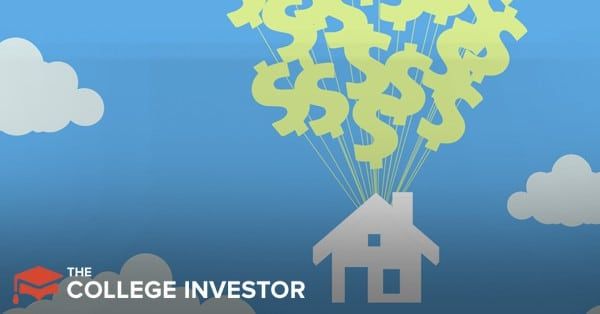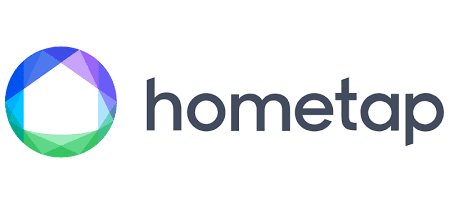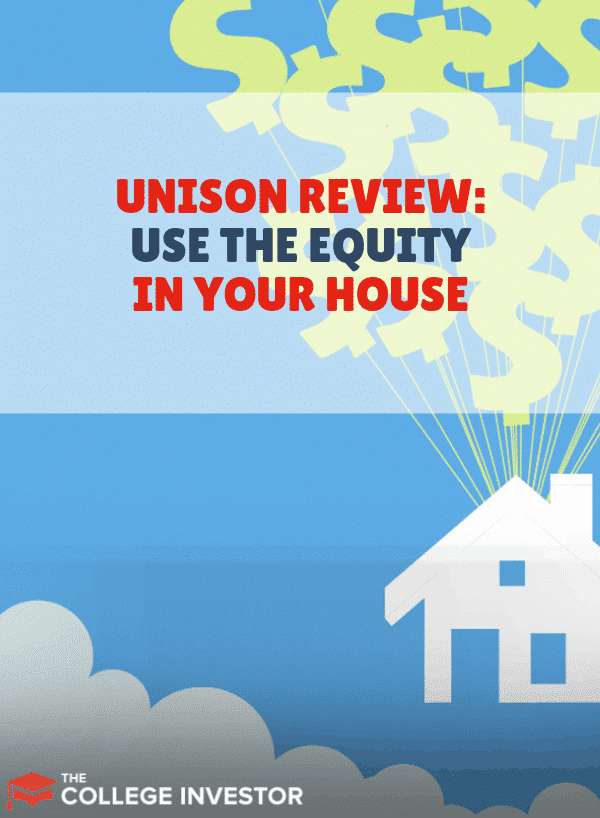
Unison is a HELOC alternative that allows you to sell equity in your home.
What if you could take out a home equity loan and not make a single payment for 30 years?
With traditional financing options, that's not possible. However, Unison, a home ownership investing company, can make that scenario reality.
But the extra flexibility comes at a cost of the future appreciation in your home. Is it worth it? Here’s what you need to know about Unison.
Unison Details | |
|---|---|
Product Name | Unison HomeOwner |
Equity Access | Up to $500,000 |
Term | Up to 30 years |
Transaction Fee | 3.9% |
Promotions | None |
What Is Unison?
Unison is an investment company that provides you money in exchange for a share of future appreciation in your home. Unison will provide a cash payment up to 15% of your home’s current value (with a minimum investment of $30,000 and a maximum of $500,000) in exchange for the ability to invest in your home in the future.

In exchange, Unison will take a cut of your home's future appreciation. Typically the exchange is four times the investment percentage.
So for example, if Unison invested 5% of your home's Original Agreed Value, it would receive 20% of its future value. The most it could receive is 60% since the max investment it will make is 15% of your home's value (15% x 4 = 60%). But Unison doesn't get its cut until you sell your home, until 30 years have elapsed, or until you buy Unison out of the agreement. Until then, you don't have to pay a penny.
Unison typically only invests in owner-occupied properties since rental properties tend to experience more wear and tear over time. However, it says that special pricing may be available upon request for some non-owner-occupied properties.
How Unison Works
Say you own a home that was appraised at $250,000. Unison applies a 5.0% adjustment to account for appraisal risk, so the home's Original Agreed Value is $237,500. You receive a 10% investment from Unison of $25,000 and Unison gets to keep 40% of the appreciation. After seven years, you sell your home for $337,500 which is a $100,000 appreciation.
At that point, you’ll pay Unison the original investment amount ($25,000) plus 40% of $100,000, or $40,000. In total you would pay Unison $65,000. The remaining $35,000 of appreciation profit is yours to keep.
All of the equity you built up through mortgage payments is yours to keep as well. So, for example, if you had paid your mortgage down by $30,000, you'd walk away from the sale with a total of $65,000 in your pocket ($35,000 from appreciation + $30,000 from the equity you built by paying down your mortgage).
What Happens If My House Declines in Value?
As an investor, Unison shares in upside potential and downside risk. That means it will take the same percentage of losses due to depreciation as it takes for profits due to value growth.

Again, let's say you have a house that was appraised at $250,000 (with an Original Agreed Value of $237,500) and you take $25,000 of Unison’s money in exchange for a 40% share of your home's future value. But instead of rising, the house value falls to $137,500.
After seven years, say you sell the house for $137,500. You pay off your mortgage balance ($112,500), and you have $25,000 left over. Now you’d have to pay Unison its principal balance ($25,000) less of its share in the loss. Its share in the loss would be 40% of $50,000 or $20,000. In total you’d pay Unison $5,000, meaning you’d walk away from the sale of the home with $20,000.
However, there are two important caveats to this scenario. First, if you sell within five years (three years in some cases), Unison won’t share in your losses. Second, if you haven’t done proper maintenance on the house, Unison may change its proportional share of the losses. The details about maintenance will be in your contract.
Can I Refinance My Main Mortgage?
Unison will allow you to refinance your mortgage, within limits (which we'll discuss in a moment). But securing financing could prove difficult.
Your Unison investment is technically a form of subordinate financing. Because of this, Unison says it’s likely that some lenders will decline your application, especially those that provide conforming loans.
Unison also sets its own "Maximum Authorized Debt Limit." This limit is fixed so it won't ever increase even if your home's value rises.
Can You Buy Unison Out?
Yes, if you still live in your house after 30 years, you'll have to buy Unison out or sell your house and settle your Unison agreement. You may be able to buy Unison out by taking out a HELOC, home equity loan, or even a reverse mortgage if you’re over age 62 by then.
But you can also simply use cash to buy out Unison at any time. For example, if you plan to use the money you receive from Unison to invest in a second property or business, you may be able to use your investment returns to pay back Unison quickly without having to sell your home.
Where Is Unison Available?
Unison isn’t currently only available in about half of the states in the U.S. These are the places where it currently invests:
- Arizona
- California
- Colorado
- Delaware
- Florida
- Illinois
- Indiana
- Kansas
- Kentucky
- Massachusetts
- Michigan
- Minnesota
- Missouri
- Nebraska
- Nevada
- New Jersey
- New Mexico
- New York
- North Carolina
- Ohio
- Oregon
- Pennsylvania
- Rhode Island
- South Carolina
- Tennessee
- Utah
- Virginia
- Washington
- District of Columbia / Washington D.C.
- Wisconsin
Are There Any Fees?
Yes, Unison charges a 3.9% transaction fee that is deducted from your investment amount. So for example, if you're approved for a $25,000 investment, the actual amount you receive will be reduced by $975 to $24,025.
You'll also be responsible to cover all third-party costs that are required to close the investment. For example, you'll need to pay for the home appraisal yourself as well as settlement costs such as title, state taxes, and recording fees.
How Does Unison Compare?
Unison's two main competitors are Hometap and Point. It should be noted that Unison bases the value of your home on the appraisal minus a 5% risk adjustment and won't discount the appraised value any further. Point, on the other hand, reduces your appraised value by 15-20% as a "risk adjustment."
Unison and Point allow a maximum of 30 years before the agreement ends. Hometap, however, requires its investments to be repaid within 10 years which provides much less flexibility. Still, Hometap could be a good option if you have mid-range credit as its minimum credit score is just 500.
See all the HELOC alternatives here.
Check out how Unison compares in this quick chart:
Header |  |  | |
|---|---|---|---|
Rating | |||
Equity Access | Up to $500,000 | Up to $600,000 | Up to $500,000 |
Term | 30 years | 10 years | 30 years |
Fees | 3.9% | 3% | 3-5% |
Min Credit Score | 620 | 500 | Does not disclose |
Cell |
How Do I Apply
To apply with Unison, begin by visiting its website and clicking the "Get An Estimate" button at the top right-hand corner. Next, you'll type in your street address to get an instant estimate.

If it looks like your property might be a good fit for a Unison investment, you can continue working through the application process. The process is similar in many ways to getting a mortgage. A home appraisal will be required and you'll need to provide financial documents as well.
You'll need a credit score of 620+ to qualify for a Unison investment. Unison will run a soft check on your credit reports that won't impact your credit score.
That's the only credit inquiry you'll deal with throughout the entire process with Unison. Remember, you're not applying for a loan that requires monthly payments. So unlike traditional lenders, Unison won't require a hard credit pull down the line when you're ready to finalize the deal.
How Do I Contact Unison?
New applicants can reach Unison at 1-800-330-9400 while existing customers should call 1-800-330-5800. Customer service hours are Monday through Friday, 9 AM to 5 PM (PST).
Currently, Unison's rating on Trustpilot is "Great" with an average rating of 4.0/5 from 160+ customer reviews. The company is also accredited with the Better Business Bureau (BBB) and has an A+ rating as of writing, but it does have 36 complaints with a 100% business response record.
Who Is This For And Is It Worth It?
Most Americans build up the vast majority of their wealth inside of their homes. That means that recommending any financial product that erodes home equity could leave the average person poorer.
That said, I think that using Unison could make sense if you want to tap into your home equity for an investment. For example, you may want to buy a rental property using Unison for homeowners and a mortgage from your primary bank.
It could also make sense to use Unison for homeowners if you need cash to buy inventory for your business or otherwise fund your start-up costs.
Unison FAQs
Let's answer a few of the most common questions that people ask about Unison:
Can Unison force you to sell your home?
You can use the funds provided by Unions for up to 30 years. After 30 years, you will need to either sell your home or buy out Unison.
Can I buy out Unison at any time?
Yes, you can either sell your home or buy out Unison at any time.
What if I make home renovations?
If the documented home improvement takes place after three years, you can request a "Remodeling Adjustment" to ensure that Unison won't share in the value you added to your home via the renovation.
What is the maximum loan-to-value (LTV) ratio that Unison will accept?
While allowable LTVs vary by credit score, the maximum LTV for applicants with excellent credit is 70%.
Unison Features
Equity Access | Up to 15% of your home's value |
Min Investment | $30,000 |
Min Investment | $500,000 |
Fees | 3.9% transaction fee |
Term | 30 years |
Repayment | 4x the investment percentage (max of 60% of your home's future appreciation) |
Min Credit Score | 620 |
Soft Credit Pull | Yes |
Max Debt-To-Income Ratio (DTI) | Varies by credit score |
Max Loan-To-Value Ratio (LTV) | 70% |
Prepayment Penalty | No |
Interest Rate Type | N/A |
Third-Party Appraisal | Required |
Settlement Required Upon Death | Yes, after a 180-day grace period |
Customer Service Number | 1-800-330-9400 |
Customer Service Hours | Monday - Friday, 9 AM to 5 PM (PST) |
Mobile App Availability | None |
Desktop Account Access | Yes |
Promotions | None |
Unison Review
-
Rates and Fees
-
Product and Services
-
Ease of Use
-
Customer Service
Overall
Summary
Unison invests alongside you in your home in lieu of getting a home equity line of credit. The result is that you can tap into your home equity without having monthly payments, but there are things you should know.
Pros
- Access up to $500,000 of home equity
- No monthly payments
- No new loan added to credit reports
- Settle when you sell or in 30 years
Cons
- Traditional loans could cost less overall
- If you sell your home during the first 3-5 years, or buy out Unison at any time, they won’t share in any losses.

Robert Farrington is America’s Millennial Money Expert® and America’s Student Loan Debt Expert™, and the founder of The College Investor, a personal finance site dedicated to helping millennials escape student loan debt to start investing and building wealth for the future. You can learn more about him on the About Page or on his personal site RobertFarrington.com.
He regularly writes about investing, student loan debt, and general personal finance topics geared toward anyone wanting to earn more, get out of debt, and start building wealth for the future.
He has been quoted in major publications, including the New York Times, Wall Street Journal, Washington Post, ABC, NBC, Today, and more. He is also a regular contributor to Forbes.
Editor: Clint Proctor Reviewed by: Colin Graves

